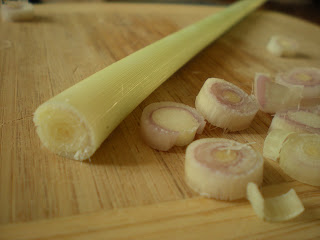
Even though it's the first kind of tea I was exposed to, I often find it too assertive and lacking subtley. I sip it much more reluctantly than I do a green tea. But I'm incredibly open-minded, so I keep trying.
In my kitchen, black tea usually ends up getting mixed with other flavors. It doesn't mind- it's bold enough to not lose its integrity. One of my absolute favorites is a Gujarati recipe that combines the bright flavors of lemongrass with Assam tea, rendering a soothing but invigorating brew.
Assam, located in the lush, tropical northeastern corner of India, is the largest tea producing region in the country, and has been for centuries.

When the tea-thirsty British tromped into Assam the early 1800's, they found rumo(u)rs of cultivation in the region to be true. Even though they failed to realize it initially- the Assam tea bushes were different than the Chinese type that the British assumed was the only true tea producer- the indigenous tribes had been tending and consuming a wild variant of tea for centuries.
You can see why even before the first sip: It brews up a gorgeous burnt sienna, with a nuanced aroma. The luminous liquid has an almost malty flavor and a smoothness I rarely taste in black teas. When mixed with a vibrant floral kiss of lemongrass, something magical happens.
Leelee Chai
Thinly slice the bottom 6 inches of 2 stalks fresh lemongrass and combine with 4 1/4 cups water in a medium saucepan. Bring to a boil, then lower heat, cover and simmer gently for 20 minutes. Strain the water into a teapot and stir 5 teaspoons Assam tea; cover and steep five minutes, then strain and discard tea. Serve plain, or with milk and sugar.
Thinly slice the bottom 6 inches of 2 stalks fresh lemongrass and combine with 4 1/4 cups water in a medium saucepan. Bring to a boil, then lower heat, cover and simmer gently for 20 minutes. Strain the water into a teapot and stir 5 teaspoons Assam tea; cover and steep five minutes, then strain and discard tea. Serve plain, or with milk and sugar.
Not surprisingly, I've always chosen the sugar route. But I was brave this morning and for my second cup, poured it straight up.
 You'd assume (much like those know-it-all British) that combining the tannins in such a vibrant black tea with the astringency of citrus would result in a mouth-puckering taste, but it's actually not so at all.
You'd assume (much like those know-it-all British) that combining the tannins in such a vibrant black tea with the astringency of citrus would result in a mouth-puckering taste, but it's actually not so at all.Even without the creamy-sweet roundness of milk and sugar, the fresh, springlike bouquet of the lemongrass unfurls in the steam from the fragrant tea, then in each smooth sip.
And if you're as sick of winter as everyone else seems to be, this is a welcome reminder than warmth is on the way.
Don't be an assam. Give it a chance.








3 comments:
love the writing, there's some alluring undertones... first 'honeybush' and now 'nice assam' -- let's not discuss, erm, bagging...
sip on.
Was a funny post, but I'm thinking of trying that recipe. I have a love/hate relationship with Assam and don't usually drink Assam whole. What?
you're both on the right track.
and the recipe is really, really good. even if you think assam tastes like ass. just try it.
Post a Comment